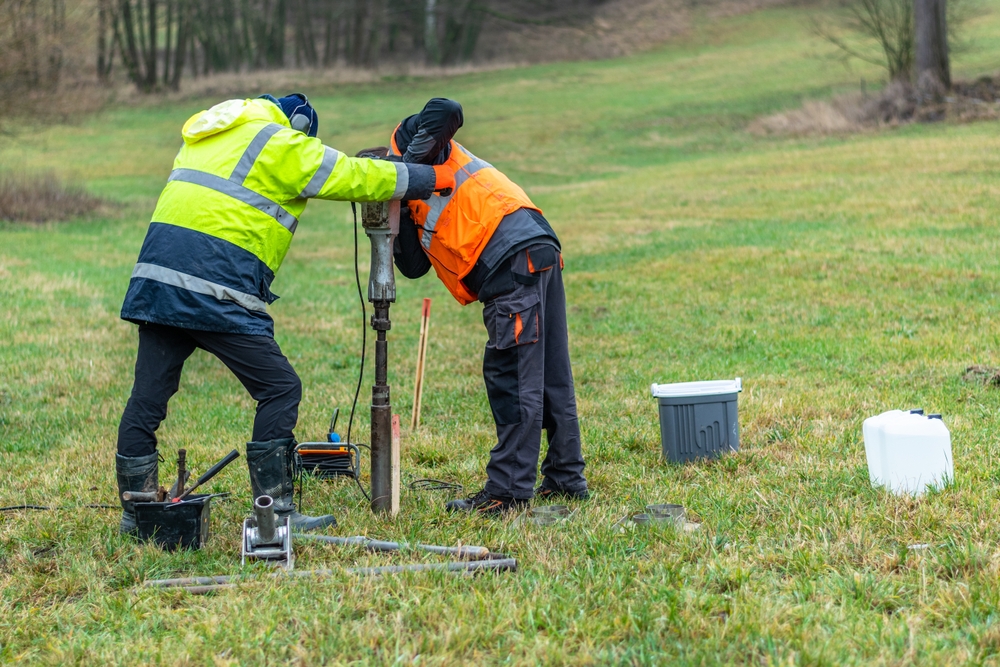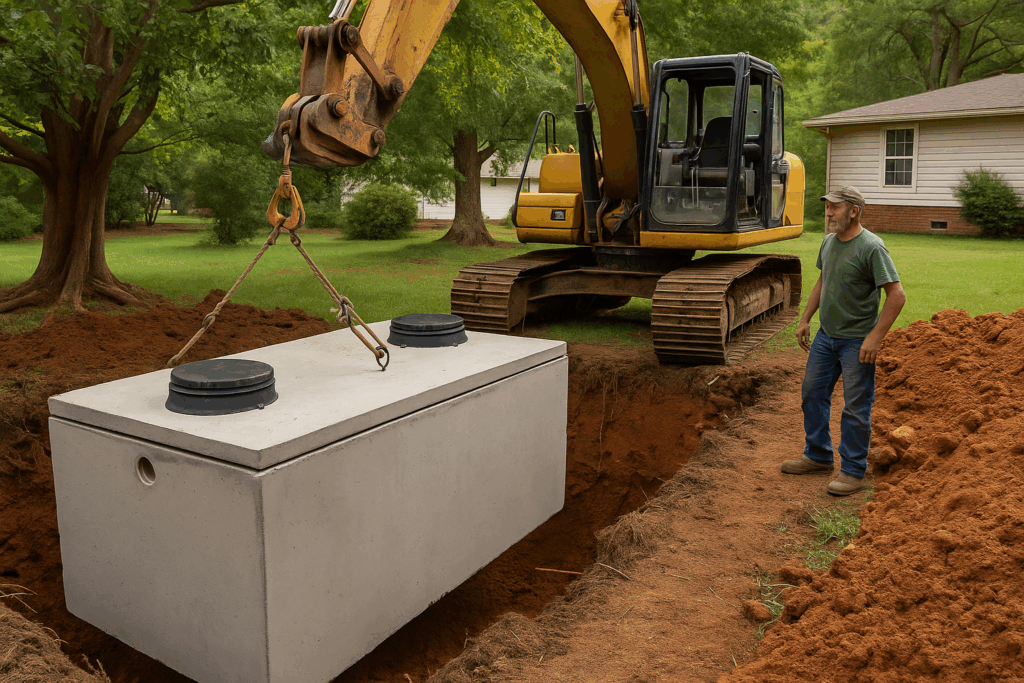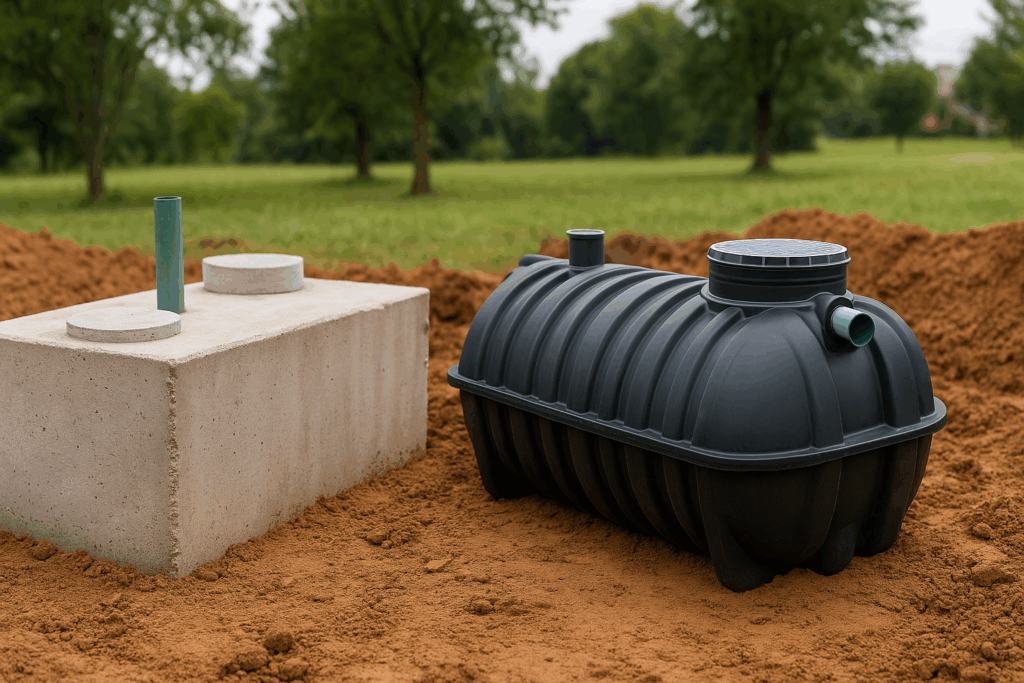The performance and longevity of a septic system in Easley, South Carolina depends heavily on the type of soil beneath your property. Soil characteristics directly determine whether wastewater drains properly, how quickly effluent is absorbed, and what kind of septic design is required. In Pickens County and throughout Upstate SC, the prevalence of clay-heavy soils and sloping terrain make soil testing and professional evaluation essential. Homeowners who understand how soil type impacts septic system design and installation can make smarter choices and avoid costly failures.
Why Soil Type Matters for Septic Systems
Septic systems rely on natural soil filtration to treat wastewater before it re-enters the environment. If the soil cannot properly absorb or filter water, the system may:
- Fail prematurely, requiring expensive repairs.
- Cause sewage to surface in the yard.
- Contaminate groundwater, wells, and nearby streams.
- Violate South Carolina DHEC regulations for onsite wastewater systems.
This makes soil evaluation the first and most important step in septic design for Easley homeowners.
Common Soil Types in Easley, SC
Clay Soils
Much of Easley sits on clay-heavy soil. While clay is dense and durable, it drains poorly. Septic systems in clay soil often require:
- Larger drain fields to allow wastewater more time to absorb.
- Alternative systems, such as mound or drip dispersal systems.
- Careful site selection to avoid pooling water and backups.
Sandy Soils
Less common in Upstate SC but present in certain pockets, sandy soils allow water to drain too quickly. This reduces filtration and can contaminate groundwater. To address this:
- Systems may require deeper trenches.
- Additional treatment measures may be needed to ensure proper filtering.
Loam Soils
Loam—an ideal mix of sand, silt, and clay—is the most favorable for septic systems. It offers:
- Balanced absorption and filtration.
- Lower risk of backups or groundwater contamination.
- Flexibility in septic tank size and design.
Rocky Soils
In hilly parts of Easley and Pickens County, rocky soils can complicate installation. Rock layers limit absorption and may require specialized excavation or engineered solutions.
How Soil Testing Works in Easley
Before issuing a septic permit, the South Carolina DHEC requires a professional soil test (also known as a percolation or “perc” test).
During this process, inspectors:
- Dig test holes in the proposed drain field.
- Measure how quickly water drains into the soil.
- Evaluate soil depth, texture, and seasonal water table levels.
- Determine whether the site supports a standard septic system or requires an alternative design.
The results dictate not only if a septic system can be installed, but also what kind of system is legally permitted.
Septic System Design Options Based on Soil
Conventional Septic Systems
Best suited for loamy soils with good drainage. These systems are cost-effective and widely used where conditions allow.
Mound Systems
Often required for properties with clay-heavy soil. Wastewater is pumped into a raised bed of sand and gravel to improve absorption.
Drip Dispersal Systems
Used in both clay and sandy soils, these systems slowly release effluent through drip tubing, giving soil more time to filter water properly.
Aerobic Treatment Units (ATUs)
These advanced systems pre-treat wastewater with oxygen before sending it to the drain field. While more expensive, they work well in challenging soil conditions.
Challenges Easley Homeowners Face
- High Water Tables – Heavy rains and poor drainage cause soil saturation, which leads to backups.
- Small Lot Sizes – Limited space reduces options for drain fields in new developments.
- Tree Root Intrusion – Dense root systems in wooded areas can clog or damage drain lines.
- Hilly Terrain – Slopes complicate excavation and require engineered designs.
Understanding these local challenges helps homeowners plan for a system that lasts.
Tips for Homeowners in Easley, SC
- Always request a DHEC soil test before purchasing property for new construction.
- Hire licensed septic contractors familiar with Easley’s soil conditions.
- Keep accurate records of soil test results, installation, and maintenance.
- Avoid planting trees near drain fields where roots can interfere.
- Schedule regular septic pumping every 3–5 years, regardless of soil type.
Why Professional Guidance Is Critical
DIY solutions may work for minor plumbing issues, but soil-dependent septic design requires expert input. Licensed professionals in Easley:
- Understand Pickens County soil maps and local challenges.
- Ensure compliance with South Carolina septic codes.
- Recommend the most cost-effective and durable system based on soil type.
- Prevent long-term failures that cost thousands to repair.
Protect Your Easley Property With the Right Septic Design
The soil beneath your home is the most important factor in septic system success. By testing the soil, selecting the right design, and working with local experts, Easley homeowners can protect their investments, avoid costly failures, and maintain compliance with state regulations.
For trusted help in septic design, installation, and maintenance, connect with licensed professionals through Easley SC Septic. Our directory makes it simple to find reliable contractors who know how to work with Easley’s unique soil conditions.
#soiltype #septicsystemdesign #easleysc #septictankinstallation #upstatesc




